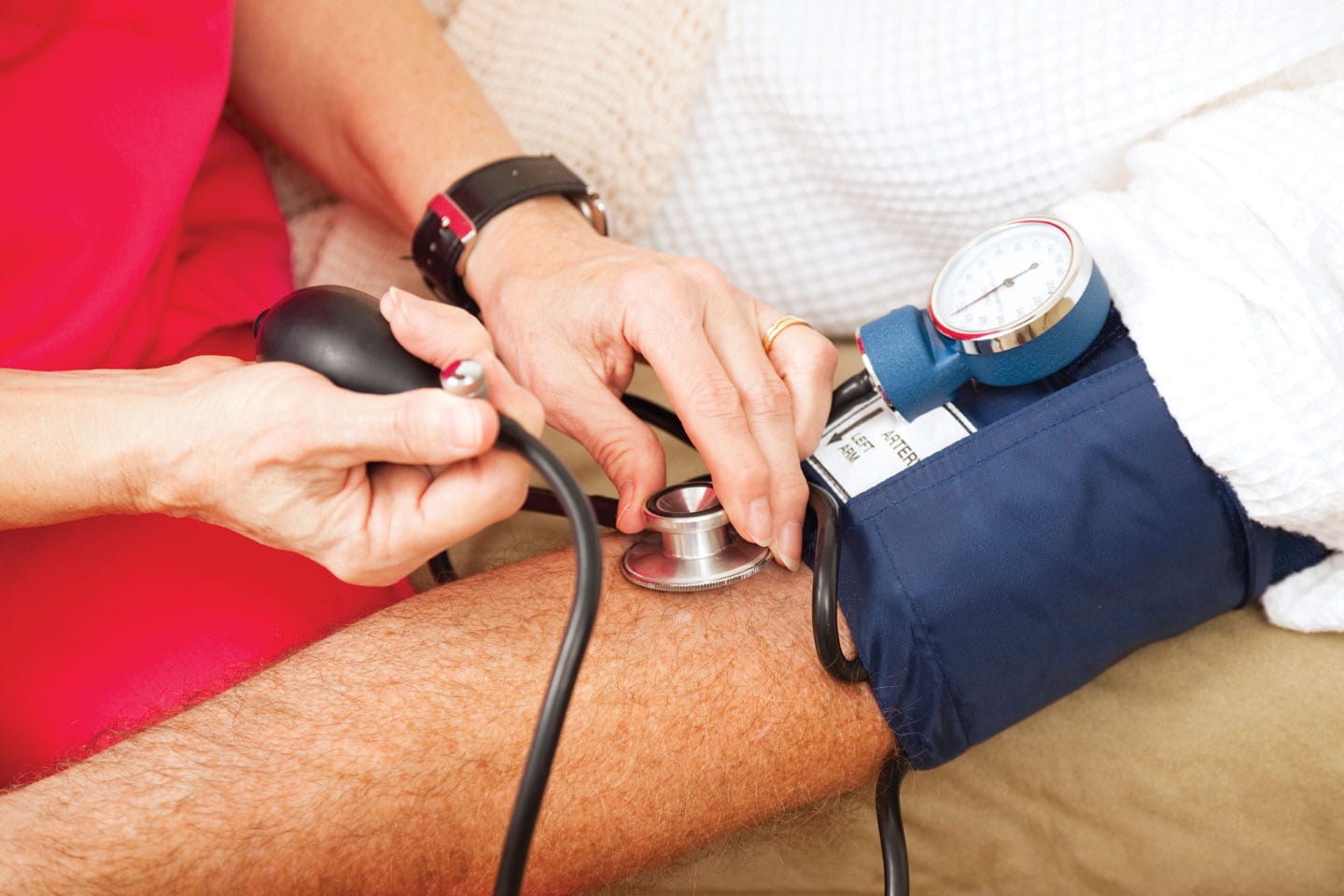Known as the “silent killer,” high blood pressure often goes unnoticed until the consequences have set in. But you can take the reins by getting informed now.
By Grace J. Humbles
What is high blood pressure?



Cardiology Services of Cleveland, SkyRidge Medical Center
High blood pressure, also known as hypertension, occurs when your blood starts to push too hard against the blood vessels that contain it. Over time, if your blood continues to exert too much force on the walls of your arteries, the arteries can wear down and thicken, causing plaque to build up that can lead to blockages.
When a doctor takes your blood pressure, he or she is simply observing and measuring what happens inside of your arteries as your heart beats and pumps blood. You’ll notice that your blood pressure is always delineated in two numbers, such as 120/80. The first number is your systolic blood pressure and the bottom number is your diastolic blood pressure. The systolic number gauges the maximum amount of pressure being put on your arteries by your blood, so it’s measured as your heart is beating. In contrast, the diastolic refers to the minimum amount of pressure in your arteries, so it’s gauged in between heartbeats when your heart is at rest.
Why is it so important?
High blood pressure is important because 1) it has no symptoms, making it easy to miss, and 2) if it goes untreated, there can be devastating effects on your health over time. Dr. Jennifer Mirza with Cardiology Services of Cleveland explains how chronic high blood pressure can lead to a host of heart and blood vessel issues. “Uncontrolled high blood pressure can lead the heart muscle to thicken, which increases your risk of heart attack and heart failure,” she says. “It can also damage artery walls, increasing your risk of a bleeding stroke and artery blockages forming in your heart and brain.”
She adds that high blood pressure can damage other organs, too. “For example, the kidneys are delicate organs that are easily damaged from high blood pressure, which can lead to kidney disease and ultimately kidney failure,” she says.
What is normal and what’s not?
According to the American Heart Association, a normal blood pressure reading includes a systolic pressure of less than 120 and a diastolic pressure of less than 80. Once your blood pressure levels
exceed the normal range in either number, your blood pressure is considered at a pre-hypertension level.
If your systolic number is 140 or above or your diastolic number is 90 or above, you will be diagnosed with high blood pressure. Doctors and health professionals categorize high blood pressure readings into three stages of severity:
- Stage 1 – a systolic pressure of 140-159 or a diastolic pressure of 90-99
- Stage 2 – a systolic pressure of 160 or higher or a diastolic pressure of 100 or higher
- Hypertensive Crisis – a systolic pressure 180 or higher or a diastolic pressure 110 or higher; this is considered a medical emergency
Are there symptoms?



Ph.D., FACC
Cardiologist, The Chattanooga Heart Institute, CHI Memorial
Determining whether or not you are suffering from high blood pressure on your own is virtually impossible. That’s why doctors urge the public to avoid waiting until there are symptoms to have numbers checked. “Unfortunately, there are usually no signs whatsoever,” says Dr. Ondrej Lisy, a cardiologist with The Chattanooga Heart Institute. “If it’s more advanced, some people may have facial flushing or dizziness. Others may have blood spots in their eyes. But most commonly there are no symptoms, and that’s why it’s so important to be proactive.”
Rather than waiting for a warning, maintain regular doctor visits and pay close attention to your blood pressure readings, especially if you know you may be at a higher risk for hypertension. Even as young as 18 years of age, it’s important to take note of your blood pressure numbers at every doctor’s appointment.
“If you are between 18 and 40, you should have your blood pressure checked every three to five years if you do not have any risk factors or previous history,” Dr. Lisy says. “If you are over 40, you should have your blood pressure checked at least once annually and those who have had previous problems should check it even more.”
For people who need to check it more often, Dr. Lisy says there are many places that offer free blood pressure measurements, such as health fairs or pharmacies. “You can also buy an automatic blood pressure cuff that can help you measure it at home,” he says.
Why is my blood pressure so high?
The Mayo Clinic explains that there are two types of high blood pressure: primary hypertension (also known as essential hypertension) and secondary hypertension.
Primary hypertension is the most common kind, and it tends to develop gradually over time. Often, there are no clear causes—it simply develops as you age. Men over 45 and women over 65 should not be surprised if their blood pressure begins to rise with seemingly no clear cause.
This being understood, there are many lifestyle factors that can play a role in the development of high blood pressure. If you carry around some extra weight, you are at a higher risk because your heart and arteries need to work harder to bring blood to every part of your body.
Additionally, if you smoke, live a relatively sedentary lifestyle, eat a high sodium diet, or drink more than two drinks a day as a man or more than one drink a day as a woman, you put yourself at a higher risk. Finally, stress may also lead to high blood pressure, so take care if you begin to experience elevated levels of stress at work
or home.
Secondary hypertension is when your high blood pressure is caused by an underlying health problem or medication. For example, kidney issues, adrenal gland tumors, thyroid problems, illegal drugs, alcohol abuse, and sleep apnea are just a few things that can lead to high blood pressure in adults.
How can I best get it under control?



Family Practice
Physician, Kindred
Hospital Chattanooga
If you suspect you are suffering from high blood pressure, the most important thing you can do is to begin by talking with your doctor about what treatment is best for you. Together, you can develop the best possible course of treatment for you based on your health history and unique risk factors. In most cases, a combination of medication and healthy lifestyle changes can make a huge impact on lowering your numbers.
“There is a whole science behind which blood pressure medication will be best for a person, which factors in race, age, and a host of other variables,” says Dr. Randy Heisser, a family practice physician with Kindred Hospital. “There are also different classes of medications that can be used independently or in combination with one another, and your doctor can determine which ones will have the best effect.”
Dr. Heisser says another advantage of working with your doctor is that he or she can help monitor you and make changes if something is off. “For example, diuretic medications are very effective in lowering blood pressure, but they have a major side effect of depleting potassium from your body, so it’s very important for your doctor to be regularly checking your blood work,” he says.
Overall, it’s very possible to stop high blood pressure in its tracks – it simply requires hard work and vigilance. “If you take your medications, start forming healthier habits, and continue to follow up with your doctor, you truly can prevent this ‘silent killer’ from doing a host of damage to your organs,” Dr. Heisser says.
To learn more about whether or not your blood pressure is at a healthy level, and to find more information about how to avoid hypertension, visit the American Heart Association at heart.org.
See Related Articles










